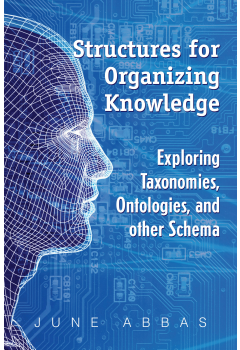Primary tabs
You don't need to be an ALA Member to purchase from the ALA Store, but you'll be asked to create an online account/profile during the checkout to proceed. This Web Account is for both Members and non-Members.
If you are Tax-Exempt, please verify that your account is currently set up as exempt before placing your order, as our new fulfillment center will need current documentation. Learn how to verify here.
- Description
- About the author
- Reviews
LIS professionals use structures for organizing knowledge when they catalog and classify objects in the collection, when they develop databases, when they design customized taxonomies, or when they search online.
Structures for Organizing Knowledge: Exploring Taxonomies, Ontologies, and Other Schema explores and explains this basic function by looking at three questions: 1) How do we organize objects so that they make sense and are useful? 2) What role do categories, classifications, taxonomies, and other structures play in the process of organizing? 3) What do information professionals need to know about organizing behaviors in order to design useful structures for organizing knowledge?
Taking a broad, yet specialized approach that is a first in the field, this book answers those questions by examining three threads: traditional structures for organizing knowledge; personal structures for organizing knowledge; and socially-constructed structures for organizing knowledge. Through these threads, it offers avenues for expanding thinking on classification and classification schemes, taxonomy and ontology development, and structures. Both a history of the development of taxonomies and an analysis of current research, theories, and applications, this volume explores a wide array of topics, including the new digital, social aspect of taxonomy development.
Examples of subjects covered include:
• Formal and informal structures
• Applications of knowledge structures
• Classification schemes
• Early taxonomists and their contributions
• Social networking, bookmarking, and cataloging sites
• Cataloging codes
• Standards and best practices
• Tags, tagging, and folksonomies
• Descriptive cataloging
• Metadata schema standards
Thought exercises, references, and a list of helpful websites augment each section. A final chapter, “Thinking Ahead: Are We at a Crossroads?” uses “envisioning exercises” to help LIS professionals look into the future.
June Abbas
Dr. June Abbas, PhD, is a Professor in the School of Library and Information Studies (SLIS) at the University of Oklahoma, Norman campus. She obtained her PhD in Information Science from the University of North Texas in 2001 and taught in the Department of Library and Information Studies at the State University of New York in Buffalo from 2001-2008 before joining the SLIS in August 2008. She also held professional positions in public and special libraries. Her research focuses on the development of user-centered digital libraries, institutional repositories, and other knowledge organization structures. She conducts research on youth and their use of technology, and the intersection between information behavior, information retrieval, and structures for organizing knowledge. The courses she teaches include those related to the organization of information and knowledge resources, cataloging and classification, indexing and abstracting, digital collections, and digital information retrieval. She has also served as project manager on ten digital libraries projects and on task forces to develop institutional repositories. Her book Structures for Organizing Knowledge: Exploring Taxonomies, Ontologies, and Other Schema was nominated for ASIST Book of the Year in 2011. She was awarded the LITA/OCLC Kilgour Research Award in 2016.
"A thoughtful survey of research finding and a stimulating complex of issues to ponder."--Library Resources and Technical Services
"This work does not disappoint and manages to stand out from the many other works in the discipline for both its thoroughness and its treatment of digital schema in the context of overall organisation of knowledge … The book is scholarly but also accessible, with many examples and illustrations provided throughout to provide real life context to the concepts described." --Australian Library Journal
"Although primarily intended for students of library and information science, researchers in library and information science and related fields will also find this mostly theoretical and conceptually oriented book useful. In addition, the practicing library and information science professional will be able to make practical use of the book's suggestions and guidelines for organizational application ... Through excellent organization and depth of coverage of the subject, the author provides the reader with a solid foundation for thinking about knowledge structures for further practical implementation." --Catholic Library World
"An excellent primer on expanding one's concepts of knowledge organization, Abbas' book is important reading for library and information science students learning about the organization of knowledge, as well as library professionals working in the cataloging and metadata fields, who have both the opportunity and the expertise to revitalize knowledge-organization structures." --College and Research Libraries



